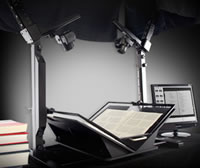 Reading this “Did Watson Succeed On Jeopardy By Infringing Copyrights?” article got me thinking about copyright again.
Reading this “Did Watson Succeed On Jeopardy By Infringing Copyrights?” article got me thinking about copyright again.
Someone commented that OF COURSE google book scanning is copyright infringement. here is my (perhaps naive) reply:
So reading a book is copyright infringement? because i now have a copy in my brain. (think of it like “memorizing a poem”, if you prefer). My memory is pretty good, so I could sit down and type out the book anytime I want.
does it become infringement when I type the book out? or when I let people know I’ve created this physical copy? or only when I distribute the new physical copy?
???
The key is : “scanning a book in” is different from “printing a book out.”
Google book scanning facilitates the process of printing out my own hard copies. I should be at fault if I complete the process by printing out a physical copy.
Technically computers aren’t storing physical copies. they store bits (quantities of electricity if you prefer), which can be interpreted visually as similar to paper. but this “quantity of electricity” is notably different from a physical copy. In my opinion, quantities of electricity should not be governed by archaic laws, which were created to protect the owners of paper-printing presses.
…
actually it appears my comment didn’t go through, as I was asked to sign up (and then the comment was lost for a couple hours. then showed up randomly, out of order?). all good though, because I found a more pertinent comment further down – about the LAW as it exists now. “Copyrights as an instrument of LAW, is to protect the said work in a fashion to make it unlawful to duplicate.” So my response to this person was :
has someone nailed down the definition of “duplicating”?
(is this a known quantity, legally?)
If I read a book, have I “duplicated” it in my brain (chemically)? What if I have a great memory, and can type it out anytime I want to?
I am now like google books,right? a tool that might assist in the infringement act?
… I don’t see it. don’t agree with this interpretation.
Technically, isn’t scanning a book the process of interpreting light into quantity of electricity? Is it “duplicating” to turn physical ink-on-paper into a virtual string-of-bits?
Feel like I’m missing the point (and maybe some precedents), but can’t think on it further than this point.
CarlWeathersForPres made a cool comment (Feb 17th, 2011 @ 3:35pm):
“Honestly, it’d be like saying that Google infringes copyrights when it uses it’s memory banks(internet) to return results.”
Today, law in general has become noting more than a tool for the most powerful in our society to codify and legitimize their power after the fact. This is too bad, because The Rule Of Law is a great good idea, but our government and businesses have become so corrupt we aren’t very familiar with the idea in practice.
I mention this because your musings as to whether or not essentially 19th century ideas on copyright should apply to technology today, this is a mute point since we no longer have the ability to agree on and enforce rational law.
So let’s assume we have a revolution and the Warrens of the world get a chance to setup a more ration system. (We’ll leave the Waldows out since Autophagy isn’t very rational…) So then you Warrens should keep in mind that copyrights also protect authors and help them profit, THE LENGTH OF TIME COPYRIGHTS & PATENTS HOLD HAVE BEEN MASSIVELY EXTENDED OVER TIME. So perhaps there should be protections for books regardless of their being pulp or electronic for say 5 years, instead of essentially indefinite. This idea of balance between private profit and public good is completely lost on crazy leftists and dinosaur rightwingers. (Disney is a main culprit extending copyright length so they can squeeze more pennies out of Steamboat Willy)